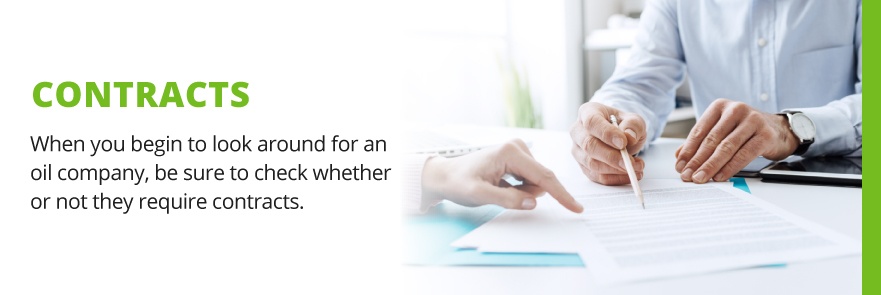
Choosing a fuel oil company can be a daunting task. On the surface and at first glance, all propane and oil suppliers seem relatively similar. They all claim good things, but how do you know for sure which ones are better than others? What makes one good, and what are the things you should be looking for in an oil company, anyway?
Deciding between one heating oil supplier and another is something that takes a little bit of knowledge and practice. While theoretically, any company will get the job done, it can’t be denied that some companies will provide you with a better experience than others. The trick is in learning how to find these companies and recognize them.
To help you learn how to spot a great oil company, we’ll take a look at some of the ways you can tell different companies apart and learn what makes one company a better choice than another. By the time we’re finished sharing everything we know, we hope you’ll feel confident and ready to make your decision.
What to Look for When Picking a New Fuel Oil Company
On the one hand, choosing a fuel oil company is a task all of its own, with its own set of rules and standards. On the other hand, however, it’s exactly like choosing any other company to work with or patronize. Most of the same rules that apply anywhere else will apply here as well.

Just like with any other type of company you might do business with, there are a number of things that are important. You want a company that’s trustworthy, has fair prices and deals with its customers honestly. You want a company that provides high-quality products and has excellent customer service. Ideally, you want a company whose patrons and customers can’t stop talking about and recommending it.
But how do you find a company like that? Here are a few tips to help you get started.
1. Find Info and Reviews of the Company
One of the first things you should do when investigating a potential service provider is research. This shouldn’t come as a surprise, as it’s likely the same first action you would take when investigating any company you’re considering visiting.
Imagine you were considering eating out at a restaurant you’d never visited before. You might do a quick search online to see what people were saying about the food and the service. You might also do the same thing if you were searching for a new doctor or a dentist. In most cases, you would hardly just walk up to the first one you found. Instead, you would likely ask around and learn what people are saying about that particular practice.
Choosing an oil or propane company is no different. As you hear of a company that you think might be a good potential fit, you’ll want to buckle down and do some research on the company.
The company’s website is usually a great place to start. Browse their “About Us” page, and scan the site to see if there are any customer testimonials. As with most businesses, they’ll likely only choose to highlight positive reviews and testimonials, but that’s no reason to discount them altogether. Those reviews can still shed a great deal of insight on the company and its relationship with the public.

Another great thing to try is to simply Google the company and see what results come up. You might browse forums, social media or message boards where people discuss their experiences with the company and explain why they might or might not recommend them to anyone else. You could even try targeting your searches more accurately by looking for reviews or testimonials of the company in question. It might take a bit of searching, but you’re sure to find helpful information.
Once you learn what people are saying about the company, let this inform you as you decide whether to continue pursuing this supplier or move on to a different alternative.
2. Ask Existing Customers
This is a similar tactic as doing an online search, and it's one that will yield results of a similar nature. One of the reasons asking existing customers can potentially be even more helpful than looking at testimonials from past customers, however, is that present customers will be informed and educated on current customer policies. After all, if you’re only looking at reviews from customers who haven’t worked with the company in question for years, they may not be aware of recent changes an updates. Existing customers, on the other hand, will be able to share this information.
To find existing customers, you can try some of the same tactics you would to find basic customer reviews. Browse Google, message boards and forums. Beyond this, though, we recommend asking around to your friends. Ask them if they’ve ever had dealings with the company and what their experience was. Even if no one in your immediate circle of acquaintances has, the odds are good that they will know someone who has.
 3. Look for Sign-up Deals
3. Look for Sign-up Deals
It goes without saying that every company wants you to choose them. They’re interested in having your business, and in many cases, they’re willing to do what it takes to convince you to pick them over someone else. While every business is different, some companies will be willing to throw in extra gifts and things to persuade you to sign up with them.
These extra sign-up bonuses can be a lot of different things. In some cases, you might get a discounted rate for your first few weeks or months. In other cases, it might be an actual extra gift that you’ll receive as a thank-you for signing up. While you shouldn’t be swayed into joining a company you otherwise don’t like the looks of just because they offer a sign-up bonus, it might be just the thing to tip the scales in one company’s favor if you’re on the fence between two choices.
Sometimes, these offers extend beyond the time of sign-up and commitment. Take a careful look at the companies you’re considering and see what other special offers they might have to tempt you with. For instance, when you enroll in Smart Touch Energy's auto-fill program, you can receive a certain number of cents off per gallon. There might also be referral programs you can benefit from. Check with your provider often — benefits and bonus programs can change, and you might be eligible for those offers.
While you should never allow your desire to take advantage of a special or bonus cloud your judgment of the company as a whole, these are great things to look for all the same. In cases where all your choices seem equally great, this can be helpful in choosing one over the other.
4. Check to See If They Require Contracts
Depending on your situation, contracts can either be good or bad. On the one hand, they can be convenient. By signing a contract that locks you in with a certain provider for a specific amount of time, you effectively spare yourself the worry and trouble of needing to hunt for a new provider anytime soon. You guarantee that you and your chosen provider will work together for the foreseeable future, and that truly can save you a lot of worry and hassle.
However, contracts aren’t always beneficial. Sometimes, they can be far less convenient and even outright damaging. Imagine you are under a contract to stay with a propane supplier for a period of two years. However, during this time, imagine the supplier decides to raise their prices, or perhaps the quality of their oil declines. Maybe they begin charging a large number of extra fees.
Perhaps the situation is even slightly more innocent than this. Maybe everything about the company you’re working with stays exactly the same, but a new company pops up, promising far lower prices and boasting glowing customer testimonials. You would love to switch over to this new supplier, but your contract locks you in with your current supplier.

When you begin to look around for an oil company, be sure to check whether or not they require contracts. If a contract is their only available option, it might be worth being slightly wary. Ideally, you will want to find a company that offers you flexibility and options. Perhaps they offer the option of a contract, but they don’t require it. If they require all their customers to sign contracts, however, we recommend approaching this company with caution.
5. Investigate Who Owns the Tanks
This might not initially be the first thing on your mind when it comes to choosing an oil provider, but it’s well worth taking a moment to pay attention to.
Who owns the tanks that the oil or propane is going to be going into? Is it you, or is it the company in question? If you’ve never done this before, you may not have a preference. If you’re an old pro and already have your own tanks, however, you’re not going to be interested in a program that only uses the company’s tanks. On the other hand, if you need oil tanks, you won’t be able to work with a company that only uses your tanks.
Always investigate this beforehand and ask yourself who owns the tanks you’ll both be working with. Whether it’s a rental, purchase or loan situation, it’s always best to have a solid grasp of what the situation will be before you begin.
6. Look Into the Kinds of Fees They Charge
Many companies clearly state the prices of their products and services. They’re very upfront about how much specific things cost. This can create the impression that you know exactly how much you’ll end up paying in the long run — but don’t be so sure. In more than a few cases, these listed prices aren’t always an accurate indicator of what your final payments will be.
This doesn’t mean companies actively lie about their prices. It just means that more often than not, there are many hidden fees placed carefully throughout the purchasing process, so that by the time you’re finished adding it all together, the final price is far higher than you thought it was going to be.

Just a few of the potentially hidden fees you’ll want to keep an eye out for include:
- Delivery Fees: Realistically, delivery does cost money. Because of this, you shouldn’t be too surprised if you spot a delivery fee. This is fairly standard. Instead of looking at delivery fees as an unexpected inconvenience, try looking at companies that waive the delivery fee as ones that have just earned another mark in their favor.
- Tank Maintenance Fees: This is another fee that might be hiding somewhere just out of sight. Some companies may charge it, and others may waive it. If you love a provider in every other way, don’t let this fee turn you off. However, you may be able to find a company that doesn’t charge you for this service. At the very least, compare these fees charged by different providers and opt for one that keeps this fee to a minimum.
- Convenience Fees: These are ones to be especially wary of. This is just a miscellaneous fee that some companies may charge. If you absolutely must go with a company that charges this fee, be sure to investigate it ahead of time and make sure it’s kept to a minimum. It can be all too easy to suddenly find yourself paying large amounts of money in these mystery fees.
7. Compare the Prices Side by Side
With all these fees, you might rightly wonder how you can ever hope to make an accurate price comparison. It can indeed be difficult, but don’t be discouraged. It’s certainly possible.

To compare prices, you’ll need to compile a list of all the fees and prices you’ll be charged at each individual provider. This means looking at more than just the price listed on the surface. Calculate the hidden fees in as well, including things like delivery and extra service charges.
An additional tip is to make sure you’re comparing prices for the same service or product. Different companies may list their prices in different formats, making it confusing to compare. For example, you may be looking at the price of a six-month contract, and comparing it to the price of a twelve-month contract without even realizing it. To get an accurate picture of how prices of different companies compare with one another, then, make sure you're including all applicable fees and be certain you’re looking at equivalent offers or products.
8. Investigate Delivery Time
After all is said and done, what’s most important is that you get the oil you’re paying for, and it’s the quality you need and expect. However, that’s not to say that additional factors such as convenience shouldn’t affect your decision.

When you compare one provider to another, take a look at their expected delivery time. Many companies will have this listed on their websites, and this information will be easy to find. Other times, it may be less apparent, but there are still ways to find it. Browse a site’s FAQ section if you can find one, or read through the pages that detail how their service and delivery procedures typically play out.
Try browsing the review sites you were looking at earlier and see if any of them mention a delivery time. If the company in question is notorious for late deliveries, this is sure to come up in at least one or two reviews. If, on the other hand, they’re responsible about delivering quickly, you’re also likely to hear mention of this.
You can also get the answer to this question by asking the company directly. Contact them by phone, email or website and ask them how long their typical deliveries take. This question is completely acceptable to ask, and many companies probably even expect to be asked about it.
How Do You Weigh These Factors Against One Another?
You may be looking through these different criteria for evaluating different oil companies and providers, and still feel bewildered. After all, it’s one thing to know that you should keep an eye out for hidden fees, but it’s another thing entirely to know how these different factors stack up and weigh against each other. Is it better to have great reviews or great delivery time? What if the company has no extra fees but locks you into a long contract? Which is the most important, and which should you prioritize?
The shortest and best answer is that there is no perfect one-size-fits-all answer to this question. You’re the one who decides what’s most important to you. And the things that matter the most to you might be completely different than the ones that matter to other people.

To help you decide which factors matter the most, we recommend making a list of your needs, followed by a list of your wants. This means taking all your priorities into consideration and deciding which ones are absolutely must-haves, which ones would only be nice to have and which ones don’t matter to you at all.
For example, you might determine that you need to have a company that fits within your specified price range. You might also decide you need a company that won’t lock you into a contract. Then, you might decide you would really like a company that delivers within your preferred time range, but you don’t absolutely need this. Finally, you might realize that you don’t really care too much who owns the oil tanks.
Based on this, you’ll have a much clearer picture of which oil company will be the best fit for you and your needs.
One of the criteria we do recommend prioritizing, however, is customer reviews and feedback. While one bad review in the midst of a flood of good reviews shouldn’t be enough to turn you away from an otherwise great company, you should be mindful of what the general crowd is saying. If the overwhelming majority of people have negative things to say about a company, then we don’t advise joining, no matter how many sign-up bonuses they offer.
Partner With Smart Touch Energy Today
Looking for an oil or propane company to fulfill your energy needs and checks all the boxes on your “must-have” list? We hope you’ll consider our services here at Smart Touch Energy. We proudly serve communities throughout parts of ME, NH, MA, CT, RI, NY, PA, NJ, DE and MD. If you live in one of the areas we service, then we invite you to take advantage of our high-quality products and top-of-the-line customer service.
Search current prices in your area today to get started.




